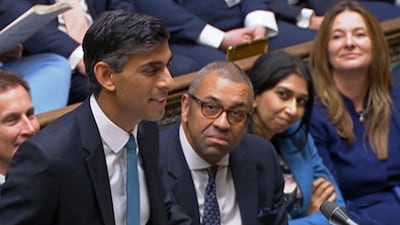The simplest questions are often the best, although surprisingly they may be the most difficult to answer. One question, in various versions, doing the rounds at Westminster is this: “How do you get to be Suella Braverman?”
Ms Braverman was – until she was dismissed by Prime Minister Rishi Sunak – British Home Secretary. That meant, along with the Chancellor of the Exchequer, the Foreign Secretary and the Prime Minister himself, she was promoted – or over-promoted – to be one of top four most powerful political figures in the UK, in charge of policing and law and order in England.
Her sacking – astonishingly twice from the same senior job in a little more than a year – was much deserved. She described pro-Palestinian demonstrations as “hate marches”. Police say that 300,000 people marched in support of Palestine last weekend. March organisers claim 800,000.
The idea that hundreds of thousands of British people are fuelled by hatred seems, at best, bizarre and, at worst, inflammatory. And it inflamed.
But the real hatred came from a far-right, violent and angry mob of anti-Palestinian protesters who attacked police and were out for trouble. There were more than a hundred arrests from among this brainless rabble.
Ms Braverman had suggested that police are biased against right-wing protesters and favour left-wingers. I have interviewed senior police chief officers for years and have failed to find any obvious far-left-wing sympathisers.
In Britain (unlike, say, France) police are operationally independent. They are under political scrutiny but not direct political control. The Home Secretary has oversight, but chief constables use their independent judgement, and can – for example – ban marches considered likely to be violent.
It’s a hugely difficult job. Police put themselves in harm’s way. They take risks and deal with people I would never wish to meet.
There have also been well-publicised cases of police getting things wrong.
For example, after the kidnapping and murder of a young woman, Sarah Everard, by a serving police officer in 2021, London’s Metropolitan Police tracked down the killer but broke up a protest vigil in a heavy-handed way.
Yet it is extraordinary – perhaps unprecedented – for a serving Home Secretary to attack the independence and leadership of the UK’s most important police force in the way Ms Braverman has done.
Even now that she has lost her job, it’s still worth considering why the British political system promoted someone with boundless ambition yet limited talent for solving real problems.
Her key political talent was for stealing newspaper headlines. She claimed homeless people made a “lifestyle choice”. She said that rough sleepers – who live in wretched conditions – should have their tents removed.
Her most controversial flagship policy is to send undocumented migrants to Rwanda. On Wednesday, an English court will decide whether this supposed “solution” is legal, or the flagship sinks. But whether the Rwanda policy works or not on immigration, it has worked already for Ms Braverman.
It has turned her into front page news, the darling of the Conservative far right, tipped as a possible successor when – if – Mr Sunak loses next year’s general election. But there’s a catch.

Most British people are not hard-right Conservatives – those once called the “Nasty Party” by former Conservative prime minister Theresa May. Ms Braverman is merely the latest incarnation of the decades-long internal Conservative civil war between moderates, some of whom were purged over Brexit, and right-wing ideologues.
For Ms Braverman, damaging the reputation of the police is merely collateral damage to her unbounded ambitions. But as a police chief once told me when I criticised failures in his force: “If the police didn’t exist, if we were not putting ourselves in harm’s way, then ordinary citizens like you would have to be the police force. Whatever our flaws, we need the public’s support.”
The alternative to professional policing could only be, he said, as in Hollywood westerns – a posse of citizens.
The word “posse” is Latin, and the full phrase is “posse comitatus”. It’s an old English and American tradition. It means (roughly) “the power of the county” in which historically in England (and the US), a local sheriff or other official could command ordinary citizens to join up in an armed group to arrest evil doers.
The undermining of professional British police officers doing their job under very difficult circumstances is, frankly, daft as well as despicable. A Home Secretary who does not understand that simple truth is unfit for office.
What is most interesting about the events of the past few days is that Mr Sunak has now brought in former prime minister David Cameron as part of a wider reshuffle of ministers.
Mr Cameron is seen as a safe pair of hands while Ms Braverman was seen as precisely the opposite. But it should be remembered that it was Mr Cameron himself who unwisely ordered the 2016 Brexit referendum that allowed all the forces of right-wing English nationalist ideology and troublemaking to assert themselves within the Conservative party.
Getting rid of Ms Braverman may solve one part of the problem, but the divisions in the Conservative party are deep and resistant to change.





















